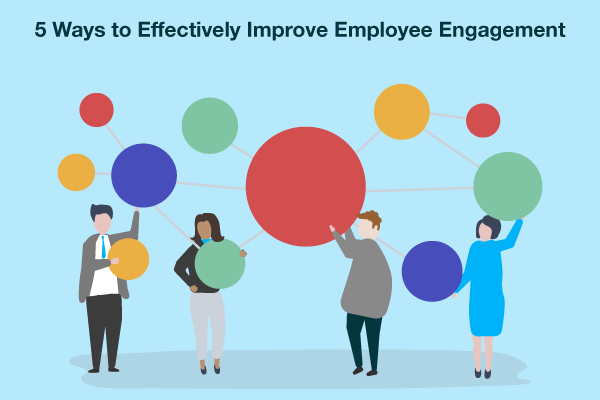
It's no secret that hard-working employees who are engaged, productive, motivated and efficient are moving any company forward. Employee engagement is a major benefit for a company. Still, no matter how good an employee may be, they are not automatically engaged when they start working for you.
As a matter of fact, engagement must be inspired and encouraged and not expected from employees. But this is oftentimes a lot more difficult to achieve than it sounds. According to Gallup’s State of Global Workplace Report from 2017, 85% of workers worldwide are not engaged and some of them are even actively disengaged with their jobs.
One of the main reasons is that employers tend to believe that a simple raise in salary will ensure employee engagement. However, even though it's a good motivator, money isn't always the top priority for employees. With that said, a lot of employees are more focused on the work environment and work conditions than on salaries. With that in mind, here are a few ways you can improve employee engagement.
Recognize their good work
Positive recognition in the workplace is an excellent way to motivate employees to become engaged. A lot of employers or managers oftentimes ignore employees to the point of making them quite disengaged. If you want to make sure your teams are doing their best and that they're feeling good about it, you can't neglect them in any way.
The simplest thing you can do is appreciate their hard work. Even a simple "thank you" or a "good job" can go a long way in making employees motivated. It shows that you're noticing what your workers are doing, as well as that you appreciate them for what they're doing. Moreover, you should do it every chance you get, such as after reaching a milestone, overcoming a difficult challenge, successfully completing a project and so on.
Don't micromanage them
It's not uncommon for employers or managers to want to keep things tightly under control. You end up revising every little thing your employees do and constantly linger over them, in order to ensure they don't make a mistake. This type of behavior indicates that you're micromanaging your workers. Micromanagement may seem like a good idea to you but it's quite the opposite.
As a matter of fact, micromanaging can result in employees becoming disengaged, counterproductive, having very low morale and becoming unmotivated to work efficiently. According to Workplace Health Survey from 2017, even 74% of workers reported feeling micromanaged and overwhelmed with trivial activities.
If you want an engaged workforce, then let them do their job. Trust your employees that they'll get things done on time. Encourage them to meet goals but don't rush them. Your employees will, therefore, become productive and engaged because you trust them and give them space to work as best as they can.
| Ensure long-term employee engagement by exploring how to improve retention rates with employee retention platforms. |
Reward your employees
As mentioned before, employee recognition is a great way to make them engaged but you can go a step further to ensure their engagement by rewarding them for all the good work they do. Your rewards should be meaningful and they should be presented on various occasions. As an example, you reward employees with extra free or vacation days for successfully completing a project.
'In addition, you can reward them with a customized prepaid Visa card for their birthday so that they can buy whatever they need. In any event, meaningful rewards can be a great motivator for your employees and it will encourage them to become engaged, productive and more efficient at work. Rewarding employees will not hurt your company's budget but it will do wonders for employee engagement. Aside from that, it will encourage employees to continue to do their best in the future.
Provide them with proper flexibility
Oftentimes, employees cannot fully engage at work because they're bothered by personal matters. As an employer, there's not much you can do to help your employees fix things at home. However, you can provide them with proper flexibility that will allow them to achieve work-life balance and even manage to become fully engaged at work.
The flexibility you provide can mean a lot to your employees. For instance, you can include flexible working hours. Allow employees to come in late or go home early as long as they manage to do all the work for the day. Also, allow employees to work from home for a couple of days.
Remote work can be refreshing and it can allow employees to tend to personal matters while still managing to work. Last but not least, allow employees to take a few days off with no questions asked. People tend to burn out because of a busy work schedules and they simply need some time to recharge.
Don't forget about learning and development
If you want to increase engagement in the workplace, you should keep in mind that employees find motivation in learning and development opportunities. This means that you should show willingness to discuss their growth and progress. Investing in employees growth can mean anything from offering in-house training to sending your employees to seminars and courses.
Having the opportunity for re-skilling and/or up-skilling to participate in different company projects can also be a great motivator for your employees. This will offer them a chance to expand their skills beyond their usual assignments and diversify their knowledge.
Diversifying the workflow will not only keep things interesting and dynamic but also show your employees that they have chances for both vertical and horizontal growth within the company.
Engaged employees are crucial for growing and developing your business further. As mentioned before, you can't just expect from employees to be engaged. Instead, you must be the one to inspire them to be engaged. There are many ways you can do this and the choice is yours. Just make sure you do it right and that your employees will be encouraged to follow your lead.

